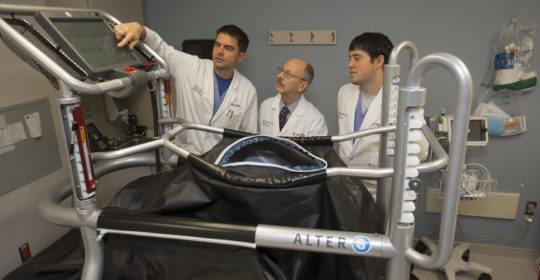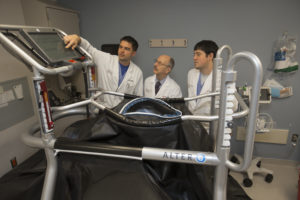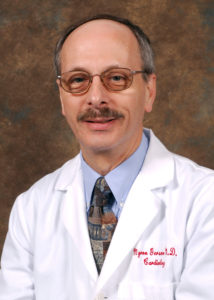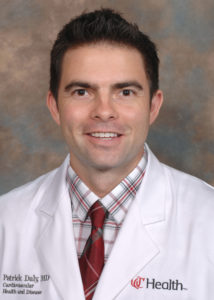
AlterG Treadmill May Transform Stress Testing for Cardiac Patients
The Division of Cardiovascular Health and Disease of the University of Cincinnati (UC) Medical Center is the first in the United States to study the AlterG ® Anti-Gravity Treadmill Pro 2001 to diagnose cardiovascular diseases and conditions. Myron Gerson, MD, emeritus professor of medicine, UC Medical Center, and Patrick Daly, MD, who recently completed his cardiology fellowship at UC and now has a faculty appointment, are the principal investigators of a study evaluating the use of the AlterG treadmill in stress myocardial perfusion imaging. The study’s goals are to assess the safety of the equipment and the improved imaging quality of blood flow to the heart muscle.

Myron Gerson, MD, center, reviews the AlterG Treadmill in place for a clinical trial at UC Medical Center. UC/Joseph Fuqua II
The impetus for the study, says Dr. Gerson, came from a desire to improve diagnostic testing of coronary artery disease, the leading cause of death in the United States.2 “Stress testing, with nuclear imaging or echocardiography, is the principal diagnostic method,” says Dr. Gerson. Exercising the patient on a treadmill to target heart rate is preferable to using the widely employed pharmacologic stressor, because the pharmacologic stressor also directs blood flow to digestive organs, which attenuates image quality. “The extra physiologic data that we obtain from treadmill testing, such as duration of exercise, blood pressure response and the heart rate that is achieved, are highly valuable for prognosis,” he says.
In the current study which started in December 2015, “Anti-gravity Treadmill Exercise in Stress Myocardial Perfusion Imaging,” [NCT02628002],3 investigators are testing the hypothesis that the AlterG treadmill can be safely used in stress testing in patients who are not able to undergo conventional treadmill exercise. The randomized, single blind, controlled study will enroll up to 75 subjects who have been referred for a single-photon emission computed tomography scan and cannot exercise to target heart rate on a conventional treadmill. In the test arm, subjects will exercise according to the Bruce protocol unweighted to 75% of their body weight; this will be adjusted to 50% or 25% unweighted during the test if they are unable to reach target at 75% weight. When they have achieved their target heart rate on the Bruce protocol, patients will receive the Tc-99m injection and maintain target heart rate for one minute after the injection. In the other study arm, patients undergo standard pharmacologic stress testing. Dr. Daly observes that “even patients who do not reach their target heart rate on the anti-gravity treadmill still achieve sufficient exercise that may enable us to better predict clinical outcomes.”
The advantage of the AlterG treadmill, according to Dr. Gerson, is that the machine “provides lower body lift, with air raising the trunk, making exercise easier because weight is taken off the legs.” To date, 45 patients have used the machine and found it “safe and comfortable,” says Dr. Gerson. The treadmill has been used solely in orthopedic rehabilitation and sports training, which is how it came to be considered for use in a cardiology study. Dr. Gerson and Dr. Daly had visited a rehabilitation facility to watch its use in sports-related injury recovery and wondered about its adaptability for cardiovascular testing. They developed a proposal to test the machine for this use and approached AlterG, Inc., which approved UC’s research request. AlterG is a Fremont, California company that licensed the technology from the National Aeronautical and Space Administration (NASA). The device was created to offer astronauts on the International Space Station a way to exercise in a weightless environment.
Regarding future studies, Dr. Gerson anticipates a larger efficacy study “to show that the AlterG anti-gravity treadmill improves diagnostic efficacy.” Other studies that are being discussed include AlterG’s use by heart failure and stroke patients.
Learn more about Dr. Gerson’s work with the AlterG by viewing this Scholarvision.
References
1. AlterG® Anti-gravity Treadmill. Available at: http://www.alterg.com/products/anti-gravity-treadmills/p200/athletic-trainer. Accessed June 22, 2016.
2. CAD and leading cause of death: Centers for Disease Control and Prevention. Heart disease facts. Available at: http://www.cdc.gov/heartdisease/facts.htm. Accessed June 22, 2016.
3. Anti-gravity treadmill exercise in stress myocardial perfusion imaging.
Available at: https://clinicaltrials.gov/ct2/show/NCT02628002?term=alter+g&rank=2. Accessed June 22, 2016.
 Myron Gerson, MD
Myron Gerson, MD
Emeritus Professor of Medicine
Phone: (513) 558-3087
Email: gersonml@ucmail.uc.edu
Connect with Dr. Gerson on Doximity
 Patrick Daly, MD
Patrick Daly, MD
Cardiologist (volunteer faculty appointment)
Phone: (513) 558-3087
Email: dalypk@ucmail.uc.edu

